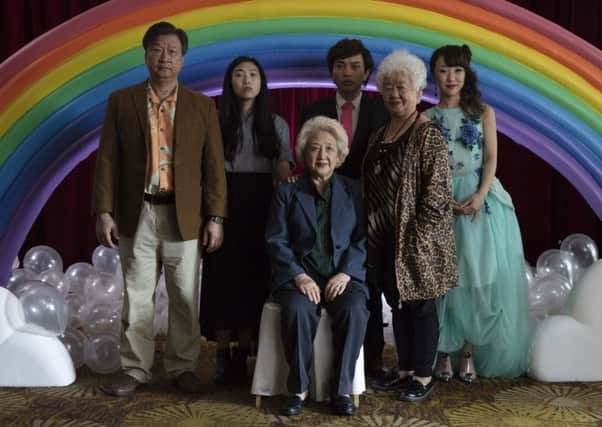Lulu Wang on lying to her grandmother for her new film The Farewell


Movies based on true stories always feature a degree of creative license. When filmmaker Lulu Wang decided to make a feature about the strange turn of events that followed her beloved grandmother’s cancer diagnosis, though, she faced a more unusual challenge: how to make a movie based on an actual lie. The lie wasn’t her grandma’s illness: in 2013, her Chinese grandmother, or “Nai Nai,” really was diagnosed with cancer and given three months to live. The lie was her family’s decision to withhold this information from her (a custom in China), even bringing Wang’s cousin’s wedding forward by a year so they’d have an excuse to visit her en masse one last time without raising any suspicion.
It’s a decision that both upset the American-raised Wang (who wanted to tell her), but also fascinated her, inspiring her to write and direct The Farewell, a bittersweet comedy drama that’s in the process of becoming a genuine break-out hit after racking up higher per-screen averages than Avengers Endgame when it went on limited release in the US this summer.
Advertisement
Hide Ad“I knew right away I wanted to do it as a movie,” says Wang, over the phone from her home in Los Angeles ahead of the film’s Scottish premiere at this year’s Glasgow Youth Film Festival. “I just didn’t know what the tone would be until later.”
Starring Awkwafina (Ocean’s 8, Crazy Rich Asians) as Billi, a young Chinese American woman wrestling with her family’s request to keep her Nai Nai in the dark, The Farewell delivers an exquisitely nuanced, slyly funny exploration of the machinations of family life, one that transcends the absurd screwball elements – the elaborate deceit, the hastily arranged marriage – thrown up by the culture clash at the heart of the real story.
“I was actually making a screwball romantic comedy when this happened to me,” says Wang, referring to her debut feature, Posthumous (2014). “This felt like a real-life screwball comedy, but as the situation unfolded what was really interesting was how emotional the whole experience had been for me, but also how undramatic it was from an external perspective. If someone tells you there’s this crazy set up where you can’t tell your grandma and there’s a wedding, you expect there will be a moment of reconciliation and catharsis –the things that you see in the movies. Maybe I was hoping for that to make the story more interesting, but I never got that. I never got a moment to tell her the truth or say goodbye.”
Sharing her story first as an episode of the NPR podcast and radio show This American Life back in 2016, Wang realised the amount of internal conflict that she was struggling with as she tried to respect her family’s wishes and process her own grief at the imminent loss of her Nai Nai was what made the story interesting. So she fashioned the film accordingly, resisting requests from American and Chinese backers to make a broader, more sentimental film.
There is, however, a further bizarre twist to the story. Her Nai Nai is still very much alive, six years on, and the family still haven’t told her about her illness – a testament, perhaps, to the benefits of the lie, but also a development that has necessitated additional layers of screwball-like subterfuge. When the movie went into production last year, not only did Wang cast her real aunt (who instigated the lie), she shot it two blocks from her grandmother’s neighbourhood in Changchun and
let her visit the set. “It was a little nerve-racking having her so close to the production,” she admits. “She came to the set a couple of times when we were doing outdoor scenes and it ended up being fine. She wasn’t suspicious; everybody on the crew knew not to tell her. Why would they?”
Advertisement
Hide AdDid constructing another lie to make the movie – she told her Nai Nai the film was about her family, but for obvious reasons wasn’t specific on the details – make it feel as if she was going through the same process again? “What was hard about the experience first time was that no-one seemed to take my side,” says Wang. “No one really saw my perspective. And by the time we made the film, everyone was in China because they understood my perspective. I didn’t feel as alone. I’d also come to accept that it wasn’t my decision; it was my family’s decision. In a way I guess we were all entangled. They entangled me in the lie and I entangled them in the movie, which is a continuation and complication of the lie.”
What happens when her grandmother wants to see The Farewell is the next big hurdle. “Oh, she already wants to see it,” says Wang. “We’ve been able to stall her by telling her we’re not allowed to send it over. Once it’s released in China, that’s going to be trickier, but that date hasn’t been set yet so everyone is like, ‘We’ll deal with that problem when it actually comes.’”
The Farewell screens at the Glasgow Youth Film Festival on 13 September and goes on nationwide release on 20 September.